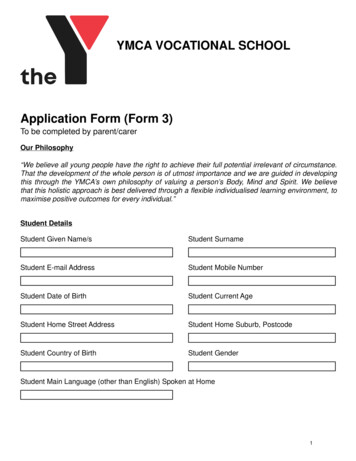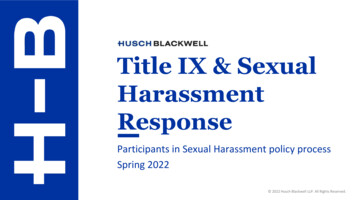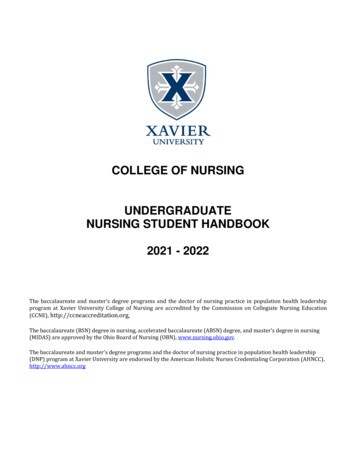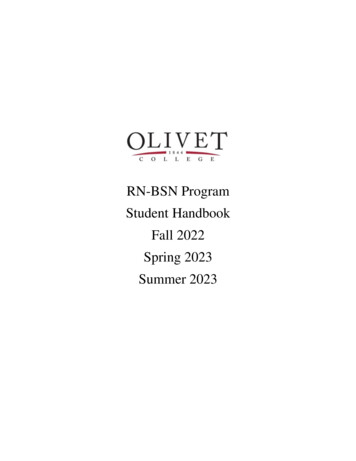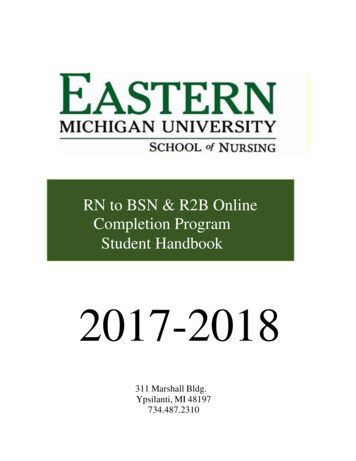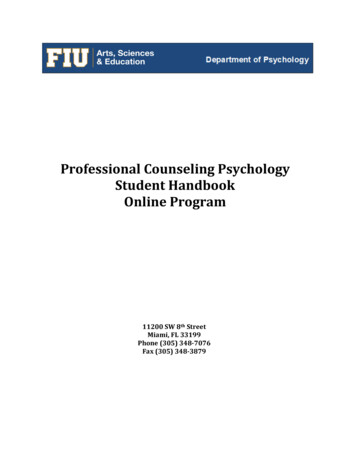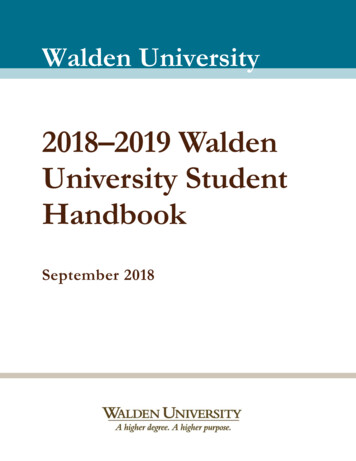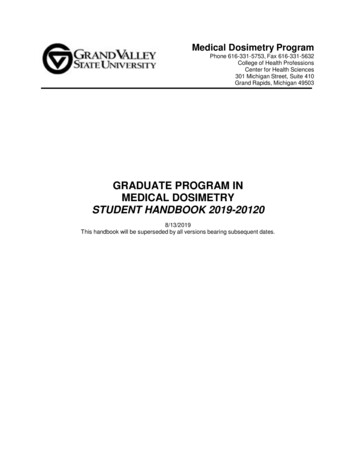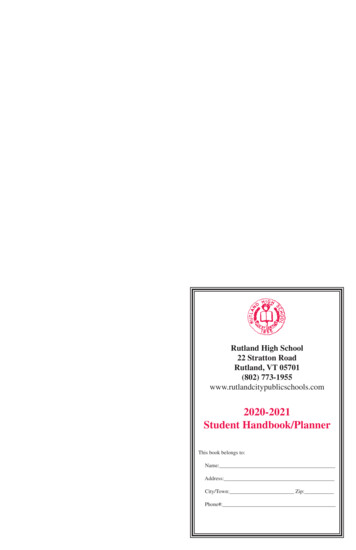
Transcription
Medical Student HandbookPublished by the Office of Admissions and Student AffairsRevised November 20201
TABLE OF CONTENTSTABLE OF CONTENTS.2LETTER FROM THE ASSOCIATE DEAN FOR ADMISSIONS AND STUDENT AFFAIRS .4ADMINISTRATION OF TULANE UNIVERSITY SCHOOL OF MEDICINE .5STATEMENTS ON DIVERSITY AND NON-DISCRIMINATION .6DIVERSITY STATEMENT.6TULANE UNIVERSITY ANTI-DISCRIMINATION POLICY .7TITLE IX .7NON-CURRICULAR ACADEMIC POLICIES.8SCHOOL OF MEDICINE ACADEMIC CALENDARS.8PROMOTION AND GRADUATION POLICY .8ESSENTIAL FUNCTIONS/TECHNICAL STANDARDS.8EXEMPTION OF BASIC MEDICAL SCIENCE COURSES .9CLINICAL ROTATION REQUIREMENTS .9HIPAA (HEALTH INFORMATION PORTABILITY AND ACCOUNTABILITY ACT) TRAINING .10UNIVERSAL PRECAUTIONS TRAINING.10EXPOSURE TO ENVIRONMENTAL HAZARDS POLICY .10USMLE REQUIREMENTS: STEP 1 AND STEP 2 .13EDUCATIONAL SITE REQUESTS .14SENIOR SCHEDULING REQUIREMENTS .14RIGHT TO A HEALTHCARE PROVIDER NOT INVOLVED IN EVALUATION .14GRADING POLICY .15GRADING GUIDELINES FOR PRE-CLINICAL AND CLINICAL COURSES .15GRADES FOR CLINICAL ROTATIONS (T3 AND T4 YEARS) .15REPORTING OF GRADES.18PRECLINICAL (T1 AND T2) ELECTIVE COURSES .19CLINICAL (T3/T4) ELECTIVE COURSES.20RETENTION AND STUDENT SUPPORT .20ACADEMIC DEFICIENCIES, RESOLVING DEFICIENCIES, AND GROUNDS FOR DISMISSAL .21APPEAL PROCESS FOR GRADES AND MSPE .23APPEAL PROCESS FOR RE-ADMISSION .24MASTERS OF MEDICAL SCIENCES .24STUDENT RECORDS .24FERPA: POLICY ON ACCESS TO STUDENT RECORDS .25TRANSFER STUDENT/CREDIT POLICIES.25ABSENCES AND LEAVES.25STUDENT EXCUSED ABSENCE POLICY .25LEAVE OF ABSENCE .28FINANCIAL MATTERS .29FINANCIAL AID .29TUITION REFUNDS FOR WITHDRAWALS .292
STUDENT CONDUCT AND BEHAVIORAL EXPECTATIONS .29CODE OF STUDENT CONDUCT (UNIVERSITY POLICY).29MEDICAL STUDENT CODE OF PROFESSIONAL CONDUCT (SOM) .29WORK HOURS .29DRESS CODE .29EMAIL.29HONOR CODE (SOM) .30ALCOHOL AND OTHER DRUGS POLICY (UNIVERSITY POLICY) .30NARCOTICS, MARIJUANA, AND OTHER CONTROLLED SUBSTANCES .30POSSESSION OF WEAPONS.30STUDENT SERVICES .31OFFICE OF MEDICAL EDUCATION .31DISABILITY ACCOMMODATIONS .31COUNSELING AND SUPPORT SERVICES .32STUDENT MISTREATMENT PROCEDURE .33HEALTH CENTER FOR STUDENT CARE .34EMAIL ACCOUNTS/LISTSERVS .35LEGAL ASSISTANCE .35LIBRARIES .35PARKING SERVICES .36MAIL SERVICES .36SECURITY INFORMATION AND POLICIES .36EMERGENCY INFORMATION .36CRIME REPORTING OR REQUESTING SECURITY SERVICES .37TUSOM POLICE.37EMERGENCY AND HURRICANE PREPAREDNESS .39HOW STUDENTS CAN REPORT CONCERNS .40SOM LEARNING ENVIRONMENT / MISTREATMENT OR PROFESSIONALISM CONCERN .40TULANE UNIVERSITY CONCERN OR INCIDENT .41INDEX .433
LETTER FROM THE ASSOCIATE DEAN FOR ADMISSIONS AND STUDENT AFFAIRSElma I. LeDoux, MD, FACP, FACCDear Incoming Medical Student:Welcome to the Tulane Community. This handbook provides basic rules and regulationsconcerning procedures at Tulane University Medical School. Although I realize that the life of amedical student, especially one about to begin the first year, is harried, please read thisdocument carefully. This handbook has information that will be very useful to you.Information on grading policies, student conduct, emergencies, and student resources are alldetailed in this handbook. Please also note that the School of Medicine maintains a policywebpage that is updated regularly and may be more up to date than this handbook.Care has been taken to make this as “user friendly” as possible and to ensure that all includedrules make sense. Also note, that this handbook is updated each year to make sure that it iscurrent and accurate. The most up-to-date version of this handbook can always be found onthe Student Affairs sI wish each of you luck and success in medical school at Tulane. These next several years shouldbe years of growth and maturation as you become physicians. Remember, our office is alwaysavailable to help you. I look forward to participating in your development as physicians.Sincerely,Elma I. LeDoux, MD, FACP, FACCAssociate Dean for Admissions and Student Affairs4
ADMINISTRATION OF TULANE UNIVERSITY SCHOOL OF MEDICINESenior Vice President and Dean. L. Lee Hamm, MDExecutive Dean .Patrice Delafontaine, MDAssociate Dean for Admissions and Student Affairs . Elma LeDoux, MDVice Dean for Academic Affairs . N. Kevin Krane, MDAssistant Dean for Admissions and Recruitment . Cindy Morris, PhDDirector of Admissions . Michael WoodsonDirector of Student Health and Wellness . Karen Weissbecker, PhDDirector of Student Career Services . Chayan Chakraborti, MDAssociate Dean for Graduate Medical Education. . .Jeffrey Wiese, MDAssociate Dean for MD/MPH Program and Faculty Affairs. . Marie Antoinette Krousel-Wood, MDDirector, Multi-Cultural Affairs .Bennetta HorneOffice of Admissions and Student Affairs StaffAllys Dierker . Registrar and Departmental AdministratorRoberta Cartaginese . Program Manager, Major EventsKatrina D’Aquin, PhD . Director, Learning Communities and Career ServicesSherrill Harrell . Executive SecretaryCarmen McCaffery . . Senior Program Coordinator, Student EngagementKim Melerine . Program Coordinator, Records ManagementMelissa Riley. Student Records SpecialistMichael Woodson . Director, Admissions5
STATEMENTS ON DIVERSITY AND NON-DISCRIMINATIONDiversity StatementMissionTulane University School of Medicine (TUSOM) values diversity. Tulane defines diversitybroadly to include: persons of color, members of the LGBTQIA community, members of diverseethnic groups including those typically underrepresented in medicine, members ofeconomically disadvantaged groups, and any others who bring a different perspective to thelearning environment. The School of Medicine believes in a rich educational experience for allstudents through the infusion of cultural competency, sensitivity, and attentiveness.Additionally, the School of Medicine values the sum total of ideals and perspectives of allindividuals engaged in and connected to the educational process.VisionThe vision of the TUSOM is to cultivate an environment of inclusiveness and equity for thelearning community. These efforts will promote social justice throughout the medicaleducation community, diminishing the occurrences of discrimination based on race, ethnicity,gender, sexual orientation, religion, or ability. This effort will generate conscientious globalcitizens primed to provide vital medical care to the diverse population in southeasternLouisiana and around the globe, thus advancing health equity.Values Statements We believe that diversity is a fluid, ever evolving concept. We believe that examining a variety of perspectives will add value and substance to allparticipants in medical education. We believe that medical education cannot remain stagnant and must evolve to stayrelevant to trends in the population and innovation of technology in order to effectivelyaddress the needs of local, national, and global citizens. We believe that emphasizing diversity will spur advocacy for the underserved. We believe that enhancing engagement at the undergraduate medical student level candevelop a pipeline of a diverse applicant pool of graduate medical students, residents,faculty members, and administrators. We believe that enhancing diversity will enable TUSOM to remain aligned with theguiding principles and standards of the Liaison Committee on Medical Education. We believe that creating a collaborative, service-minded, learning environment willdiversify the community of physicians by increasing the number of traditionallyunderrepresented students who earn medical degrees. We believe that enhancing diversity will have a direct impact on decreasing currenthealth disparities currently existing in underserved communities as well as the effects ofsocial determinants of health in providing healthcare to local, regional, and nationalcommunities.**Approved by Executive Faculty, March 21, 20176
Tulane University Anti-Discrimination PolicyTulane University is committed to creating and maintaining a campus environment where allindividuals are treated with respect and dignity and are free to participate in a lively exchangeof ideas. Individuals have the right to work and learn in an environment free of harassment.Harassment is not acceptable and will not be tolerated at Tulane University. Tulane’sharassment prevention policies are fully outlined in Tulane’s Equal Opportunity/AntiDiscrimination Policies.Harassment is not limited to conduct of a sexual nature. Tulane University prohibits harassmentbased upon an individual's race, color, sex, religion, national origin, age, disability, geneticinformation, sexual orientation, gender identity, gender expression, pregnancy, marital status,military status, veteran status, or any other status or classification protected by federal, state,or local law. Harassment occurs when unwelcome verbal or physical conduct, because of itsseverity and/or pervasiveness, significantly interferes with an individual' work or education, oradversely affects an individual's employment or ability to learn or participate in schoolactivities. Harassment also occurs when a person uses a position of authority to engage inunwelcome sexual advances, requests for sexual favors, or other verbal or physical conduct of asexual nature.The Office of Institutional Equity (OIE) has administrative responsibility for implementingTulane’s Equal Opportunity/Anti-Discrimination Policies. Meredith Smith is the University’sAssistant Provost for Title IX and the lead individual responsible for implementing Title IX. TitleIX is a federal law that prohibits sex discrimination. Sexual harassment is a form of sexdiscrimination.Title IXIt is the policy of Tulane University to comply with Title IX of the Education Amendments of1972, which prohibits discrimination (including sexual harassment and sexual violence) basedon sex in the University’s educational programs and activities. Title IX also prohibits retaliationfor asserting claims of sex discrimination. Tulane University has designated Title IX Coordinatorsto coordinate Tulane’s compliance with and response to inquiries concerning Title IX. Faculty,staff, or students may contact the following for information:7
Meredith M. Smith, Assistant Provost Title IXand Clery ComplianceTulane UniversityTitle IX OfficeJones Hall, Suite 308New Orleans, LA 70118msmith76@tulane.edu(504) 865-5615Julia Broussard, Program ManagerTulane UniversityTitle IX OfficeJones Hall, Suite 308New Orleans, LA 70118jbrouss@tulane.edu(504) 314-2897NON-CURRICULAR ACADEMIC POLICIESThe Office of Admissions and Student Affairs (504.988.5331) is your primary source for answersto academic questions and problems. Dr. Elma LeDoux has been the dean of students sinceMarch of 2020. Her office houses the registrar function and maintains grade records andevaluations. The staff schedules dean’s hours, keeps up-to-date on curriculum requirements,processes paperwork for USMLE testing, and serves as a general resource for all student issues.The office also administers the application process for Tulane medical students applying toresidencies. The Office of Admissions and Student Affairs is responsible for the annual WhiteCoat Ceremony, graduation, and orientation activities for incoming first-year students and forthird-year students’ transition into the clinical years.The Office of Admissions and Student Affairs has a website athttp://medicine.tulane.edu/student-affairs . You can find pictures of the staff, along with staffemail addresses and phone numbers. The areas of responsibility for each staff member arelisted. The website also has information related to career planning, pre-clinical and clinicalcourses, and life as a medical student.School of Medicine Academic CalendarsThe T1/T2 preclinical academic calendars are maintained by the T1/T2 course curriculumcommittee in the Office of Academic Affairs. Detailed calendars are available in Canvas.The T3/T4 clinical academic calendar are posted in eMedley’s adfs/login.php .Promotion and Graduation PolicyTulane School of Medicine abides by the Promotion and Graduation Policy, which can be foundhere.Essential Functions/Technical StandardsTulane School of Medicine abides by the Technical Standards Policy, which can be found here.8
Exemption of Basic Medical Science CoursesGoals of the undergraduate medical program include integration across all basic sciencedisciplines and developing teamwork skills that are necessary to practice medicine in theevolving healthcare system. While it is recognized that students may enter medical school withadvanced training in a basic science discipline, even if obtained at Tulane, they will not beexempted from course work or examinations. One exception will be made for students whohave completed the Anatomy Certification Program and successfully completed gross anatomy,and who also serve as a teaching assistant for the first-year anatomical sciences courses.These students will also be required to take the same courses and examinations as all otherstudents, with the exception of the anatomical sciences courses that they teach.Appeals must be for exceptional circumstances and must be made in writing to the vice deanfor academic affairs who will convene a panel to include the associate dean for admissions andstudent affairs and the course director of the course in question. Their decision will be final.(Adopted 5/20/82)Clinical Rotation RequirementsAs of July 2020, as a response to the coronavirus pandemic, the Curriculum Committee adoptedthe following block structure for third-year required clerkships. In late 2020, the CurriculumCommittee is scheduled to review the adjusted schedule to determine if it will be permanentlyadopted for Classes of 2023 and later. As always, students must monitor their Tulane emaildaily for changes and updates to curricular requirements:Third-year requiredclerkshipsObstetrics & GynecologyMedicineFamily 06NEUR30066666633In addition, students are required to complete the following clinical requirements:RequiredclinicalactivitiesActing 5XXMED4409EMER4020Weeks/notes4 wks. Generally completed in fourth year.4 wks. Generally completed in fourth year. MD/MPH students areexempt but must complete 4 weeks’ worth of additional electives.2 wks. Generally completed in fourth year9
MedicineRadiologyRADS3020electives*VariesBeginning with Class of 2022, RADS radiology content is integratedacross third-year clerkships and will have additional asynchronous onlinecomponents. Worth 2 weeks’ of clinical required creditMonitor your email daily: in late 2020, the Curriculum Committee isscheduled to review the number of electives required to graduate.Students should plan to complete at least 22 weeks’ of clinical electivesand potentially as many as 34 weeks’ of clinical electives, depending onthe Curriculum Committee’s decision for the Classes of 2022 and later.Students are also required to complete Step 1, Step 2 CS, Step 2 CK, and 5 interdisciplinaryseminars to be eligible to graduate: Step 2 CS and CK are currently under national review andmay change after the publication date of this handbook.Descriptions and requirements for clinical rotations can be found on eMedley .php .HIPAA (Health Information Portability and Accountability Act) TrainingPatient information must remain confidential. To ensure proper confidentiality, the federalgovernment enacted HIPAA legislation. Each student must complete HIPAA training. Thisgenerally occurs during orientation for the third-year clerkships.Universal Precautions TrainingBlood-borne pathogen (BBP) training is mandatory for all medical students and must beupdated annually. Training is offered online via Canvas and is documented by the Office ofEnvironmental Health and Safety. BBP training can be accessed by clicking here and logging inusing your Tulane credentials. Students will also receive an email regarding the course onceassigned.Exposure to Environmental Hazards PolicyPolicy StatementTulane University School of Medicine informs medical students (including visiting students) ofpolicies and procedures to address exposure to infectious and environmental hazards beforestudents undertake any educational activities that would place them at risk. Medical studentsare educated about the methods of prevention, procedures for care and treatment afterexposure, including a definition of financial responsibility.Definition of Accidental ExposureAn exposure can be defined as a percutaneous injury (e.g., needlestick or cut with a sharpobject), contact of eye, mouth or other mucous membrane or non-intact skin (e.g., exposedskin that is chapped, abraded, or with dermatitis) with blood, saliva, tissue, or other body fluids10
that are potentially infectious. Exposure incidents place health care personnel at risk of diseasescaused by a range of pathogens including hepatitis B virus (HBV), hepatitis C virus (HCV), humanimmunodeficiency virus (HIV) infection, Covid-19 and therefore should be evaluated accordingto protocol by a qualified health care professional.Policy RequirementsMedical students must immediately call the Student Health Center (located in the Elks Building)if exposed. During business hours, students should call 504.988.6929. During afterhours orweekends – students should call the Nurse Advice Line at 1.855.487.0290. Visiting medicalstudents should also contact the Living Well Center if exposed. During business hours, thestudent will either be scheduled a same day visit or a phone consultation with one of thephysicians or nurses. After hours, the call will be directed to an all-call health care provider.Students also should report any exposure to their course or clerkship directors as well as theAssociate Dean for Student Affairs.ProceduresWhat is an exposure? Percutaneous injury (e.g. needlestick or cut with a sharp object), and/or eye splash orcontact with other mucous membrane or non-intact skin (chapped, abraded, ordermatitis) with potentially infectious bodily fluids and other materials including:o Bloodo Semeno Vaginal secretionso Cerebrospinal fluido Pleural/pericardial/synovial/peritoneal fluido Amniotic fluido Feceso Any bodily fluid that may contain bloodo Significant exposure to Covid person (as per CDC guidelines)If exposed, what should I do? Wash needle sticks and cuts with soap and water Flush splashes to the nose, mouth, and skin with water Irrigate eyes with clean water or saline Obtain as much demographical data on the source patients as possible Ask your supervisor to consent the source patient to testing for HIV, Hepatitis B,Hepatitis C at the time of exposure or when medically able to obtain consent. Ifpossible, obtain a rapid HIV test on the source patient immediately. Covid-19 exposure- quarantine and follow instructions of the Living Well Clinic. This mayinclude Covid-19 PCR testing. CALL the Living Well Clinic IMMEDIATELY11
During business hours, please call 504-988-4325. You will either be scheduled a sameday visit or a phone consultation with one of the physicians or nurses.During after-hours or weekends ONLY – please call 504-865-5255.Is there treatment to prevent blood borne disease after exposure? Human Immunodeficiency Virus (HIV) – may be prevented by taking post exposureprophylaxis (PEP) medications for up to 4 weeks (if indicated). Hepatitis B (HBV) – in persons who have not been vaccinated or in non-responders tothe vaccines, post exposure prophylaxis with two doses of HBV immune globulin isrecommended. Hepatitis C (HCV) – there is no vaccine against hepatitis C and no treatment after anexposure that will prevent infection.How soon after an exposure should treatment start? Post exposure treatment for Hepatitis B and HIV should be started as soon as possible,preferably within two hours after the exposure. Immediate follow-up with the Health Center even if source patient’s rapid HIV isnegative.If the source patient is known to be HIV : Determine the most recent viral load Obtain the antiretroviral treatment history, including any drug resistanceTuberculosis If a student has an exposure to
Tulane University Title IX Office Jones Hall, Suite 308 New Orleans, LA 70118 msmith76@tulane.edu (504) 865-5615 Julia Broussard, Program Manager Tulane University Title IX Office Jones Hall, Suite 308 New Orleans, LA 70118 jbrouss@tulane.edu (504) 314-2897 NON-CURRICULAR ACADEMIC POLICIES

